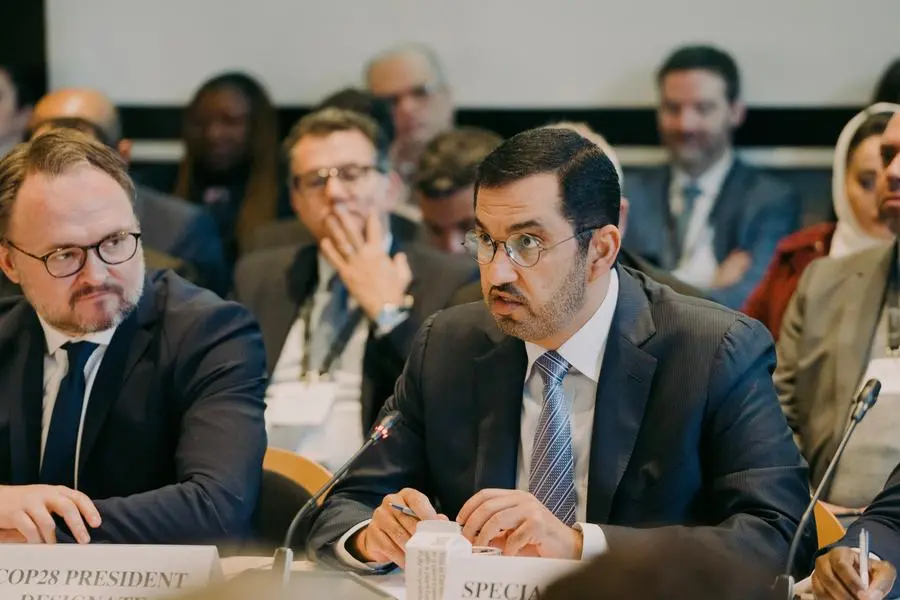PHOTO
Dr. Sultan bin Ahmed Al Jaber, Minister of Industry and Advanced Technology and COP28 President-Designate, arrived in Denmark today to co-chair the two-day Copenhagen Climate Ministerial alongside Sameh Shoukry, COP27 President and Egypt’s Minister of Foreign Affairs, and Dan Jørgensen, Denmark’s Minister for Development Cooperation and Global Climate Policy.
This convening, attended by more than 40 government ministers, is the first climate ministerial meeting leading up to COP28.
Throughout the Copenhagen Climate Ministerial, Dr. Al Jaber held a series of bilateral meetings with climate leaders and government ministers from around the world, including Simon Stiell, UNFCCC Executive Secretary; Frans Timmermans, Executive Vice President of the European Commission; Zhao Yingmin, China’s Vice Minister of Ecology and Environment; Jennifer Morgan, German Special Envoy for International Climate Action; Shahab Uddin, Bangladesh’s Minister of Environment, Forest and Climate Change; Grace Fu, Singapore’s Minister of Sustainability and the Environment; and Toeolesulusulu Cedric Schuster, Samoa’s Minister of Natural Resources, Environment and Tourism, among others.
In opening remarks at the climate ministerial, Dr. Al Jaber said, “We need to build on the foundation achieved at COP27 and move from goals to getting it done. We are way off track when it comes to the critical goal of keeping 1.5 alive. Incremental steps will simply not cut it, we need transformational progress in the next 7 years across mitigation, adaptation, climate finance and loss and damage.”
On mitigation, the COP28 President-Designate urged countries to “Scale up all available zero-carbon energy sources, while minimising the emissions from all other energy sources. Technology that no one can afford isn’t much use to anyone. Governments should therefore adopt smart policies to incentivise breakthroughs in battery storage and commercialise carbon capture and the hydrogen value chain.
We should inject a business mindset, short-term KPIs and an ambitious action-oriented agenda into the Mitigation Work Programme, and remember that the enemy is emissions, not progress.”
Dr. Al Jaber reminded attendees of the need to deliver a framework for the Global Goal on Adaptation “that meets the needs of developing countries, builds resilience, protects fragile biodiversity and enhances nature-based solutions.” He added, “At a minimum, we need to double adaptation finance and adopt national policies that build every country’s capacity to adapt to climate impacts.”
Speaking to the Loss and Damage finance facility established at COP27, Dr. Al Jaber emphasised, “We must bring the Sharm El Sheikh outcome on loss and damage to life. This means the loss and damage fund must be fully operationalised, and we need the right governance and structures in place to target the most vulnerable communities.”
“The lynchpin to all progress across climate pillars is finance. We have an opportunity to shape a new financial goal at COP28 that enables us to chart a new course for greater climate ambition,” stressed Dr. Al Jaber, as he called for “urgent reform of international financial institutions and multilateral development banks to unlock much more concessional capital, lower risk and attract more private finance. The bottom line is finance needs to be much more available, accessible and affordable.”
The COP28 President-Designate raised the critical need for “solidarity and unity of purpose”, adding, “There is simply no room for division. Progress of the kind we need can only happen through partnership, not polarisation.”
“The task ahead represents one of the greatest challenges humanity has ever faced. But, if we act with urgency, act together and act now, it also represents one of the greatest opportunities for social and economic development,” Dr. Al Jaber further said.
Copenhagen is the latest destination in Dr. Al Jaber's global listening tour – a series of international visits to engage with and listen to the views &f partners from governments, the private sector, civil society and international organisations.





















